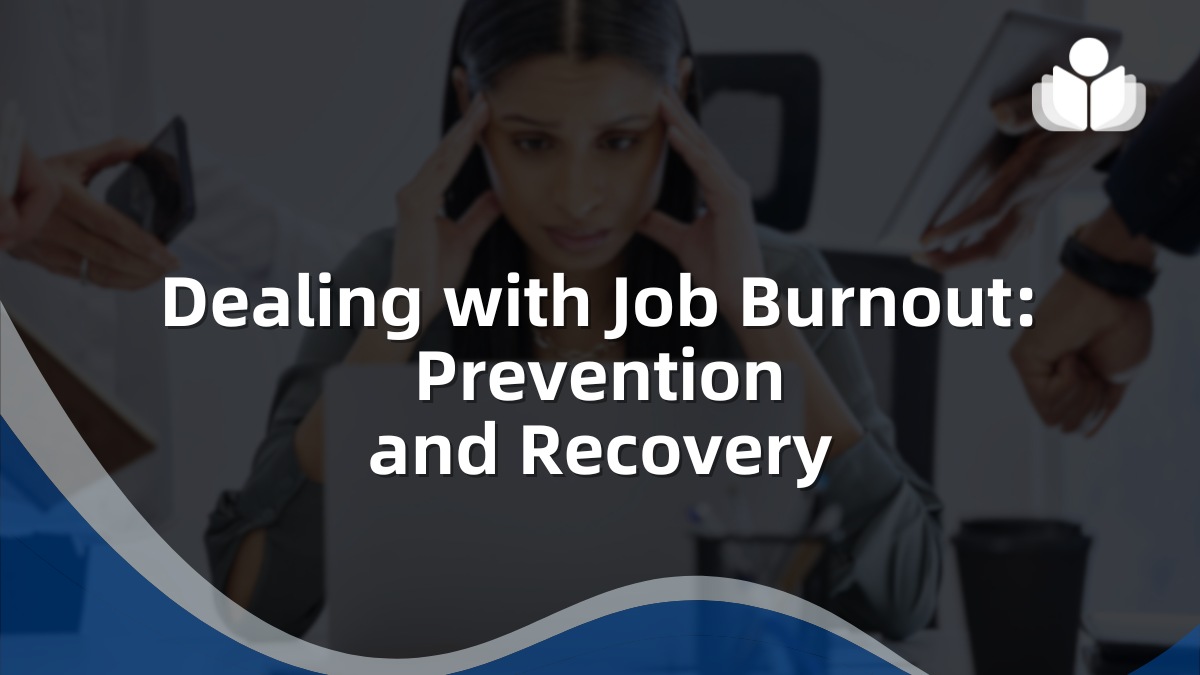Job burnout occurs when prolonged work-related stress causes a state of physical, emotional, and mental exhaustion. It has become increasingly common in today’s fast-paced workplaces, negatively impacting employees’ mental health, productivity, and overall well-being.
Left unchecked, burnout can lead to serious long-term health issues and decreased job satisfaction. In this article, we’ll explore the causes of burnout, provide actionable steps to prevent it, and offer effective recovery strategies if you’re already experiencing it.
Understanding Job Burnout
Job burnout is a state of chronic physical and emotional exhaustion often caused by prolonged workplace stress. It manifests in various ways, with common symptoms including overwhelming fatigue, emotional detachment, and a significant drop in performance.
Individuals experiencing burnout may feel drained, lack motivation, and become increasingly cynical or disconnected from their jobs and colleagues.
Causes of Burnout
Burnout typically stems from several key factors, including:
- Excessive Workload: Constant pressure to meet deadlines or handle large volumes of work without adequate support or resources.
- Lack of Control: Feeling powerless in decision-making or lacking autonomy over how tasks are completed.
- Unclear Job Expectations: Confusion or uncertainty about job responsibilities leads to frustration and stress.
- Work-Life Imbalance: A lack of boundaries between work and personal life, causing people to sacrifice rest and personal time for work demands.
The Impact of Burnout
Burnout has far-reaching effects, impacting both personal and professional life. Physically, it can lead to chronic headaches, insomnia, or even severe health issues like heart disease. Mentally, it increases the risk of anxiety, depression, and emotional exhaustion.
Regarding relationships, burnout often leads to withdrawal from colleagues, friends, and family. It results in decreased productivity, reduced creativity, and poor job performance, hindering career progression and job satisfaction.
Recognizing Early Signs of Burnout
Physical and Emotional Symptoms
One of the first signs of burnout is a noticeable change in your physical and emotional state. Common symptoms include chronic fatigue, where you feel exhausted even after resting. Irritability and lack of motivation are typical, making even small tasks seem overwhelming. You may feel helpless or trapped in your job, and this emotional exhaustion can spill over into other areas of your life, impacting your mood and relationships.
Behavioral Changes
Burnout often manifests in work behavior. You might start withdrawing from colleagues or becoming less engaged in team activities. Increased absenteeism, such as frequently calling in sick or avoiding work altogether, is a red flag. You may notice a decline in work quality, tasks you once handled with ease now seem more complex, and your attention to detail might decrease.
The Importance of Early Intervention
It’s crucial to recognize these early signs and take action. If left unaddressed, burnout can lead to more serious physical, emotional, and professional consequences. By addressing the issue early, whether through self-care, seeking support, or changing your work routine, you can prevent long-term damage to your health and career, ensuring a quicker recovery and sustained well-being.
Preventing Job Burnout
1. Setting Boundaries: Establishing clear work-life boundaries is essential for preventing burnout. Learn to say no to unnecessary tasks and avoid over-committing yourself. Limit after-hours work by setting designated “off” times when you disconnect from work emails and phone calls. This helps create a mental separation between work and personal life, which is crucial for recharging.
2. Time Management: Effective time management can reduce stress and prevent overwhelm. Techniques like time blocking (scheduling specific tasks for specific times), prioritizing tasks based on urgency and importance, and delegating non-essential tasks to others are great ways to manage your workload efficiently without feeling constantly overloaded.
3. Taking Breaks and Vacations: Regular breaks throughout the workday and periodic vacations are crucial for recharging your energy. Stepping away, even briefly, prevents mental fatigue and helps you return to tasks with renewed focus. Long vacations offer more profound rejuvenation, allowing you to return to work refreshed and ready to tackle challenges.
4. Building a Support Network: Having a solid support system is essential for coping with work-related stress. Connect with colleagues, mentors, or friends who can provide encouragement and advice. Whether through informal chats or formal check-ins, maintaining supportive relationships helps ease feelings of isolation and promotes emotional well-being.
5. Promoting Work-Life Balance: A balanced lifestyle is critical to long-term health and satisfaction. Engage in activities outside work, such as hobbies, exercise, and spending time with family and friends. This balance enhances your overall quality of life and provides a buffer against the buildup of work-related stress.
Long-Term Strategies for Avoiding Future Burnout
- Continuous Self-Care: Maintaining healthy habits such as regular exercise, adequate sleep, and engaging in hobbies is essential for long-term well-being. Prioritizing self-care helps you recharge mentally and physically, reducing stress and preventing burnout. Incorporating activities that bring you joy and relaxation into your daily routine can help sustain your energy and productivity over time.
- Regular Check-ins with Yourself: Periodically assess your mental and emotional well-being to stay proactive about burnout prevention. Reflect on how you’re feeling at work and in your personal life. Checking in with yourself allows you to catch early signs of stress or burnout and take corrective action before the situation worsens.
- Career Development and Growth: Pursuing career development or changing your role can renew your passion for work and prevent burnout. Continuous growth, whether it’s taking on new challenges, learning new skills, or shifting to a more fulfilling role, can keep you motivated and engaged. Regularly aligning your career with your personal values and interests ensures that your work remains meaningful.
- Cultivating Resilience: Building emotional resilience is critical to managing stress and returning from setbacks. Practices such as positive self-talk, setting realistic goals, and maintaining a growth mindset help you stay adaptable in the face of challenges. By fostering resilience, you’ll be better equipped to handle stress without letting it lead to burnout, keeping you focused and balanced over the long term.
Dealing With Job Burnout – FAQs
Is Taking a Vacation Helpful When Dealing with Burnout?
Yes, taking a vacation can be very helpful in managing burnout. Stepping away from work allows you to recharge physically and mentally, helping you return with a fresh perspective. However, while a vacation provides temporary relief, addressing the root causes of burnout and making long-term changes to work habits is crucial for sustained recovery.
Can Burnout Be Prevented With Better Time Management?
Yes, effective time management can play a significant role in preventing burnout. By prioritizing tasks, setting boundaries, and using techniques like time blocking, you can manage your workload more effectively and avoid feeling overwhelmed. Time management helps create a healthier work-life balance, reducing stress and preventing burnout.
When Should I Seek Professional Help for Burnout?
If you experience prolonged exhaustion, detachment, or a significant decline in work performance, it may be time to seek professional help. A mental health professional can provide guidance on managing stress, addressing underlying issues, and creating a recovery plan. Early intervention is essential to prevent burnout from worsening.
Conclusion
Recognizing, preventing, and recovering from burnout is crucial for your well-being and career success. Burnout can negatively impact your health, productivity, and job satisfaction, so address it early and take proactive steps.
Implementing the outlined techniques, such as setting boundaries, managing stress, and seeking support, can help protect your mental health and career. Remember, prevention is vital. By prioritizing self-care and staying mindful of your limits, you can avoid burnout and achieve long-term career fulfillment.
 Sections of this topic
Sections of this topic
















